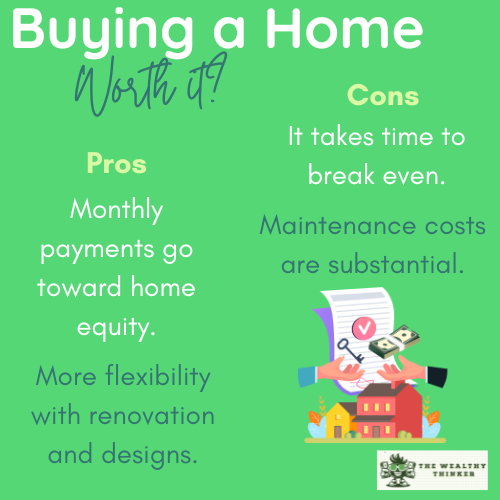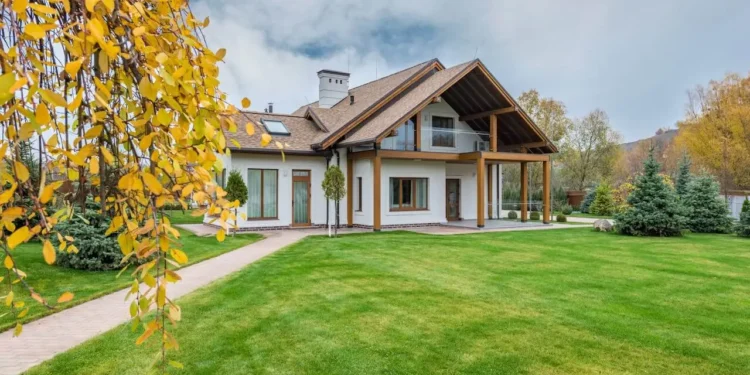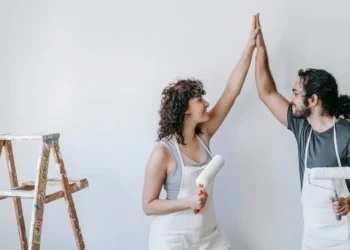For so many people, buying a home is at the top of their list in terms of life accomplishments.
Purchasing a house is frequently seen as the American dream, and many families strive to achieve it. And you’ve likely heard the mainstream sentiment that buying a home is the best investment you can make.
Buying a home helps you to accumulate capital as the value of your home increases and you’re no longer paying rent to a landlord.
- Is this, however, a true statement?
- Is owning a home a wise investment, and is it worthwhile, even as housing prices reach new highs?
The fact is that thinking of your property as an investment in the classic sense may not be a smart idea. An increasing number of Americans are doubtful that purchasing a home is the best option.
Millennial homebuyers, in particular, have discovered this the hard way, with many complaining about the hidden costs and ongoing maintenance of home ownership.
Let’s take a closer look!

4 Reasons You May Want to Avoid Thinking of a House as an Investment
For many people, purchasing a house is a fantastic decision that may provide stability and peace of mind. However, purchasing a property does not imply that you are making an investment.
Here are some reasons why.
1. It takes time to break even.
Most individuals overlook all of the additional costs associated with house ownership.
New homeowners, for example, must pay closing fees, which typically range from 3% to 6% of the overall loan amount.
If your property is worth $250,000, closing expenses might be an extra $7,500 if they are on the low end of this range. You might wind up paying $15,000 in closing expenses if they are in the higher level.
After paying closing expenses, most homeowners require four years to break even on their property.
7 Important Things You Need to Know About Getting a Mortgage
2. Maintenance costs are substantial.
Maintaining a home is expensive, because there are ongoing maintenance costs you’re going to have to deal with. On average, you can expect to pay 1% – 4% of your home’s total value on routine maintenance.
So, if you own a $250,000 home, you can expect to spend $2,500 – $10,000 a year on maintenance costs. This includes things like mowing and treating your lawn, cleaning out vents and gutters, servicing your furnace twice a year, etc.
Bear in mind, these costs are for general maintenance only. That doesn’t calculate the cost of major home repairs, like replacing your roof.
3. Rate of appreciation is slower over time.
When deciding whether or not a property is an investment, it’s crucial to consider appreciation. If the rate of appreciation is high enough, the additional value you’ll receive from the house will make the investment worthwhile over time.
Since 1900, however, inflation-adjusted property values have barely climbed by 1% each year on average. Keep in mind that this is a nationwide average; local prices may fluctuate significantly depending on your state and county.
4. It’s difficult timing the market.
Many individuals assume that buying a home is a smart investment because property prices will continue to rise. But this idea fails to account for the fact that markets move in cycles.
In a healthy economy, it is true that house prices rise with high market demand. But the same cannot be said when the economy is in a recession when house values drop.
Conventional wisdom states ‘buy low, sell high’, but timing the market and selling your house to optimize profit is challenging. You’d have to buy your property in a “buyer’s market” to make it work, which implies there are more people willing to sell than buy.
You can charge a premium price for your house in a seller’s market, and you could even be in a position to start a bidding battle to push up the price.
However, getting both circumstances just perfect is quite tough. Many folks will either sell too soon or not sell at all.
Is Owning a House Worth it?
Your property may not be an investment, but it may nevertheless help you establish a secure financial future.
Saving for a down payment, for example, is still time and effort well spent. Let’s take a look at some of the most significant benefits of owning a home.
1. Your monthly payment goes toward your home equity.
One of the most significant benefits of owning a property is that instead of handing over your monthly cheque to your landlord, you are putting it toward your home equity.
Home equity is a benefit because the more you have, the more options come with it.
Your home equity determines what you can get from selling your home. It’s also valuable as collateral for loans such as home equity loans and home equity lines of credit (HELOCs).
When you pay rent on a monthly basis, that money is gone permanently. Putting that money into your mortgage, on the other hand, is really increasing your net worth.
2. Gives you a sense of financial stability.
For many people, owning a home leads to greater financial stability. Over time, your housing costs become more predictable than what you’ll pay as a renter.
Homeowners often experience greater mental well-being than renters. For instance, homeowners are more likely to engage in their community and become friends with many of their neighbors. It’s not universal, but renters may be less likely to feel any attachment to their community.
3. Tax benefits.
There are also certain tax benefits to owning a home.
If you itemize your deductions, you can deduct mortgage interest and property tax payments on your taxes every year.
4. You’ll own more square footage.
Homeowners have greater square footage than renters, which makes it easier to raise a family.
In the United States in 2023, the average apartment size is 916 square feet, up 3% from 2022. In contrast, the typical new home in the United States is 2,411 square feet. So, if you need more space and room for a growing family, homeownership can be the better choice.
5. More flexibility with renovation and designs.
Renting an apartment or home often gives you limited options when it comes to decorating or making changes.
Some landlords won’t allow you to do things like paint or add solar panels. But when you own your home, you have control over all the decorating and renovation decisions.
6. Making your home an investment property.
Renting out your property is one method to turn your house into an investment.
This is known as “housing hacking” and is a unique way of purchasing an investment property. This works by purchasing a property, living in it as your primary residence, and then renting out a portion of it.
You might, for example, remodel your basement or lower level of your home. Then you rent out that one room to a renter while living in the rest of the house.
You may even buy a multi-unit home and rent out the remaining apartments if you don’t want to live so close to your renters. In many circumstances, you may essentially recoup your investment.
Key Takeaway on Buying a Home
Many people advocate homeownership by suggesting that buying a home is the smartest investment you can make. A house isn’t genuinely an investment unless you’re investing in a rental property that pays you money every month.
That’s because, at the end of the day, owning a home takes money out of your pocket.
Property taxes, maintenance costs and insurance are some of the routine costs you would be expected to bear as a homeowner. This excludes a whole lot of unexpected expenses that come with owning a home.
The top regret millennials who own houses is underestimating hidden expenditures. Your home’s worth may rise over time, but it is unlikely to rise enough to cover all of the expenditures.
Instead of buying a home, you could invest the money you’d save by not purchasing a property in something that’s expected to appreciate in value, such as stocks and bonds, and you’ll likely end up with more money in the long run.
Albeit, if you’re interested in trying your hand as a landlord, you can always look into house hacking. For some people, this can be a good introduction to owning a rental property.
Editor’s note: This article was originally published May 19, 2022 and has been updated to improve reader experience.



















